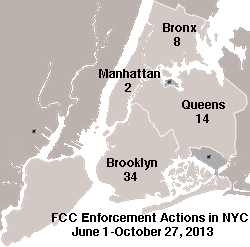It was a pretty busy summer for the federales, who not only managed to roll out their own version of the Enforcement Action Database, but made moves against pirate radio broadcasters in nine states. Among them, New York saw the vast majority of this action.
 Of the 80+ recently-logged enforcement actions (which brings the yearly total to 200), nearly three-quarters of those happened in four of the five boroughs of New York City.
Of the 80+ recently-logged enforcement actions (which brings the yearly total to 200), nearly three-quarters of those happened in four of the five boroughs of New York City.
In the month of July alone, FCC agents visited and sent warning letters to more than two dozen pirates in the city; one unlucky station op in Queens got two visits and warning letters within this time span. Continue reading “FCC Anti-Pirate Efforts Focus on NYC”
Month: October 2013
Firming the Foundation for an All-Digital AM Mandate
The quiet collection of "evidence" on which to justify an all-digital HD Radio mandate for AM stations continues.
After some stealth experimentation on a CBS station in Charlotte, North Carolina late last year, there’s word of two other AM stations in the state conducting all-digital broadcast-tests this summer. The guinea pigs were WBT, a 50,000-watt station owned by Greater Media (also in Charlotte) and WNCT, a 50,000-watt (day)/10,000-watt (night) Beasley Broadcast-owned AM station in Greenville.
WBT secured experimental authorization from the FCC to conduct these tests just two weeks before they took place; WNCT also asked for fast-track authority less than a month before its all-digital broadcasts. Continue reading “Firming the Foundation for an All-Digital AM Mandate”
Here Comes the Hammer: Pacifica to Lease Out WBAI
Uh-oh, indeed. Pacifica’s National Board is now soliciting bids to take over the programming and operations of its station in New York City. WBAI is prime real estate, transmitting with 4,300 watts of power from atop the Empire State Building on a choice frequency smack dab in the middle of the FM dial. The station’s worth tens of millions of dollars were it ever to be sold.
This was a long time coming. WBAI, like many of Pacifica’s radio stations, is caught in the jaws of a dilemma as old as community radio itself. Essentially, people can lose sight of the actual goal of running a successful and sustainable community radio station and instead use (and abuse) the station as a battlefield on which to act out some larger sociopolitical struggle. What the station stands for becomes more important than the station itself, and nobody wins. In Pacifica’s case, they stand to lose it all. Continue reading “Here Comes the Hammer: Pacifica to Lease Out WBAI”
Pirate Broadcasting in the Digital Age
In many parts of the world, radio is slowly transitioning to a digital transmission platform—but so far, this new frontier has not been plumbed by pirates. Part of this is due to the relatively immature state of radio’s digital transition, but some of the systems have been around long enough that they’re ripe for experimentation.
In very simple terms, the primary thing to keep in mind is that the heart of a digital radio transmission system is the software that controls the transmitter. The more freely-available the software, the more possible to play with. In global contention, there are three contending platforms of note, though their DIY-potential varies: Continue reading “Pirate Broadcasting in the Digital Age”
Government Shutdown: Data Held Hostage
As a radical faction of the Republican Party holds the federal government hostage, many of its gears have ground to a halt. In the 21st century, this also apparently means the disappearance of government information online.
The Federal Communications Commission announced Tuesday morning that all of its electronic databases and filing systems are offline until the agency’s funding is restored. On the meatspace tip, just 38 of the agency’s 1,754 employees are on the job, basically minding the store and limited to "duties that are immediately necessary for the safety of life or the protection of property."
Now, disabling access to online systems that do the business of the agency is logical to a point. Why collect applications or other necessary documentation that nobody can process? But the blackout of databases that effectively serve as public archives of public information is just petty. Continue reading “Government Shutdown: Data Held Hostage”